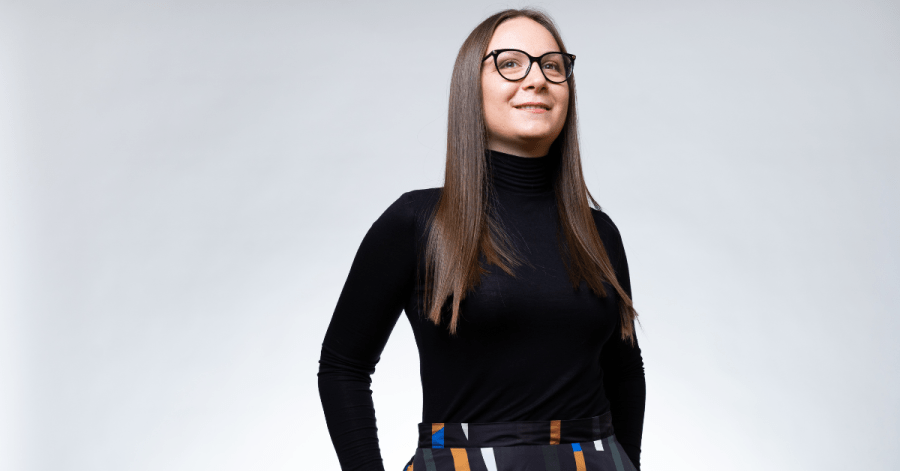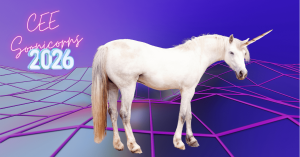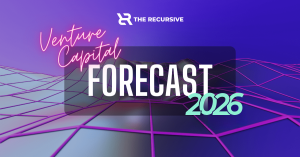Today, we meet you with Ioana Alexandra Frincu, the co-founder and COO of the first blockchain development company in Romania, Under Development Office (exited to Zitec) and the current CTO of EQIFi, a fully licensed and regulated decentralized finance platform backed by a digital bank – EQIBank.
Ioana Frincu’s relationship with technology started in third grade. One hour and a half a week, she would attend a class at school to learn how to work with a computer. She started winning national prizes before she got her own computer. That was the sign for her and the family that she had a skill. But what mattered most in choosing to pursue education and, later on, a career in blockchain boiled down to one fact: for Ioana, computers were fun.
“I was in the store testing any new device that was coming my way because, back then, we didn’t have these big online retailers. When I grew up and got to high school, I decided to pursue a career in technology. So, after graduating, I went to the Politehnica University of Bucharest. I started with electronics and not with programming because I was passionate about all those tech components and tech advancements that make working with computers more accessible,” Ioana tells me.
What follows is a conversation about her journey leading a small team of Romanian software developers and architects into acquiring some of the earliest big blockchain projects, as well as working her way up as a tech advisor and CTO in what is perceived as a male-dominated field.
We also talk about how Romanians have contributed to blockchain innovation, why and how to go beyond outsourcing, starting from the opportunities we offer in university, and how to distinguish whether blockchain can add value to a business model.
The Recursive: You jumped into the blockchain bandwagon early on, co-founding and leading the operations of Under Development Office, later acquired by Zitec. What is exciting about working in blockchain development?
Ioana Frincu, CTO EQIFi: I worked in big data and data science when I started learning about blockchain. So I saw blockchain as a different type of data processing technology. And then, reading the Bitcoin and the Ethereum whitepapers, it was clear to me that, with the birth of Ethereum, we finally had a way of developing applications at a much grander scale. I realized that suddenly you could transpose many things that are part of our daily life on the blockchain. And I made the bet that blockchain can be as big as big data.
There was also a market opportunity; I wanted to be part of it because it was pretty lucrative. So I started writing a white paper, smart contracts, and then I became a speaker at some conferences five years ago.
There weren’t many companies at the time working with this technology, so we had the opportunity to take relatively large clients and build the first applications in blockchain, even though we were a small team of 20 people in Bucharest.
How do you feel now, seven years later, about the opportunities that blockchain brings?
It was quite an opportunistic move, but I also had little to lose financially. Therefore, working in blockchain has been quite lucrative so far.
From a professional perspective, the opportunities I had working in blockchain at 23-24 were comparable to what others have at 40 in other fields.
My alternative was to continue developing only mobile and web applications, which I still do with my studio. Still, the struggle there is more price-oriented instead of innovation-oriented. Because blockchain is innovation-driven, you can afford to price a project better.
I’m proud that we were the first blockchain development company in Romania and among the first ones in Southeast Europe. It was challenging because everyone thought that blockchain and crypto were a joke. Everybody thinks I’m this secret crypto multimillionaire, which is annoying.
But I’m glad to see that there are more and more blockchains suitable for application developments, such as Romanian MultiversX or Solana, which is also carbon neutral.
How do you see Romania contributing to blockchain development and adoption?
Elrond, as a company, has put our country on the map for blockchain opportunities. But let’s remember that a considerable part of the Ethereum founding team consists of Romanian developers, who were also part of developing the new proof-of-stake consensus mechanism. Romanians have been at the forefront of this development for quite a while.
As a region, through our outsourcing lens, we have contributed to the growing number of developers in the field. Still, when you are focused on outsourcing as a country, there is little room and incentive to innovate because you become comfortable. When a local developer earns $8,000-$10,000 per month outsourcing, they are not thinking about how to innovate or start their own company. We need more companies building their projects in this field in Romania.
Becoming innovative requires getting out of our comfort zones financially and from our world perspectives. Innovation comes only out of struggle. Innovation is not a comfortable place to be in because there is a significant risk that you are taking.
I see Romania becoming more of a development hub. I genuinely hope that a company competing with the likes of MultiverseX will be born in the same area of Europe. With this bear market, we’re looking at three to five years until something comes along. I’m curious, for instance, how the Romanian company CryptoDATA will develop.
Because you have a list of struggles – if you want to do DeFi, you need to cooperate with some institutions and do KYC verification. Crypto maximalists don’t like verifications, so selling your product will be difficult. As a result, you also need to go to an audience that is not crypto, and then you can’t be decentralized because they need to become more familiar with the infrastructure. Therefore, you are in a catch-22 situation – you need to attract people who are in crypto because they have the volumes and the money and people who haven’t used crypto before.
Combining all these things is exciting and brings new opportunities.
How can we educate people about the opportunities of blockchain starting at a young age?
Partnering up with business and technology universities to teach students what blockchain is. It would be great if universities adopted the Western model of organizing guest lectures, discussing all these hot opportunities in the market – blockchain, AI, and climate technologies.
The academic environment should be more open to private companies coming in and educating and inspiring their students.
You need a space to hold the lecture and the students’ time. Then we’re dedicating our time to explaining our expertise and experience, which is just as valuable as the theoretical knowledge you learn in school. How else can universities inspire innovation and not just create programmers to do outsourcing?
Other than that, it would be great to see more hackathons, startup incubators, and accelerators targeting these technologies.
What are the potential benefits of using blockchain across different verticals and business models?
It depends on the field of business.
First, you need to ask, “what added value does blockchain bring to my business model?” This is the most important thing to look at because if your business model is working perfectly fine with no blockchain added, you do not have a valid need for blockchain.
For example, you have a fitness app that generates money because people pay a subscription; I am trying to figure out what you can do with blockchain. Maybe they can pay with crypto, but that’s a small use case. This area is the lowest-hanging fruit, but it’s also the least used now. I’ve paid with crypto only once.
But then look at banking, where blockchain can be used as a ledger for transactions and keep the information there without relying on a single server machine. This is a tough use case because combining core banking with crypto and with blockchain from a security standpoint. There’s a lot of risk involved and a lot of approvals necessary.
Another field is luxury asset authentication. A consortium called AURA researches how assets can be authenticated and have this information stored on the blockchain, which is very useful afterwards for the resale market because the pre-loved luxury assets market is being flooded with superfakes and having them traced via all their owners is excellent.
We then look at decentralized finance, my field of choice, one of the most significant use cases for a while has been decentralized trading, where you provide liquidity to a trading protocol and use it to trade. This area is suitable for those familiar with crypto because they don’t need to perform KYC verification. But keep in mind that with decentralization, consumer protection is non-existent. If you mess up something, place a lousy bet, or send it to the wrong address, you cannot take it back, whereas, on a centralized system, there may be ways to take it back. So, when you choose to use these decentralized platforms that do not respond to any sovereign authority, you decide to take the responsibility of trading on your own hands. And that can put a lot of pressure on you, especially if you are new to crypto.
Usually, blockchain can positively impact fields that rely on history, authenticity, and security.
You are currently the CTO of EQIFi, a fully licensed and regulated decentralized finance (DeFi) platform backed by a digital bank. What place do you expect DeFi to hold in the future of finance, and what role do you expect regulation to play?
Regulations are usually turning decentralized to centralized, which is precisely what crypto maximalists are not fond of, right? So, we will continue to have decentralized protocols such as Uniswap, 1Inch, and others.
But with regulation, there will be a more significant push on education, starting with how to differentiate between a regulated and unregulated DeFi platform.
Whatever platform you choose, you need to be informed and know what your consumer rights are.
Another way DeFi will evolve is by having traditional banks using fiat currencies offer investment products in crypto. For instance, at EIQI Bank, we offer people the opportunity to buy crypto, to invest in crypto, or for the bank, through its funds, to invest in crypto. That’s another way to get involved in crypto when you have a bank deposit, but the interest comes from crypto investment.
As a rule, never invest more than you can afford without having a mental breakdown.
What are your responsibilities as a CTO?
As a CTO, I create a technology strategy that aligns with the company’s strategic vision.
In simple words: the company has targets for users, customer support, and products that need to be developed, and I have to build things following that strategy. As a time frame, I’m speaking about one-two-three years.
Some people think that as a CTO you code. You don’t. CTOs who code are not CTOs who strategize. You can only do one or the other. I’m lucky to have a team of outstanding architects, developers, and quality assurance people helping me shape the vision in actual products.
In crypto, the CTO also does a lot of fund management, keeping the wallet’s keys and ensuring that the treasury is set up correctly.
I’m also focusing on having a great customer experience as I also cover part of the product vision. A CTO is a combination of a product and technology strategy leader. Now is a great time to build new products. If no one does anything and the market is silent, you can be the first one to make noise when you have a new product.
You are also advising VCs about investment opportunities in early-stage technology startups. What is your checklist for an ideal target, especially from a technical standpoint?
First, I’m looking at what value the technology brings to that company’s business model and ensuring it’s not just a buzzword.
Then, I look at the skills of the founding team. And I am not talking about programming skills. I’m talking about architecture and strategy.
I’m looking for teams with technical people as part of their core team.
Then, is the product working? You don’t need to evaluate the code of every target company. That’s exaggerated. But you can test their product, make sure that it doesn’t exist only on paper.
I’m also looking at whether the technology needs to be regulated somehow. For example, dealing with financial assets needs to be regulated in one way or another.
Finally, we can look at whether they have a token or not. Right now, I’m focusing on companies delivering products that do not create a token because there is too much energy that needs to be consumed on market making and not enough that can go to innovation, both from a strategic and budgetary perspective. If they already have a token, I’m looking at whether the team controls the trading.
How was it for you to develop in the field of IT as a woman?
We see IT as a male field although, in the beginning, it was women who were doing the programming and working with computers as it was not seen as exciting work. The parent of computing was the English mathematician Ada Lovelace.
That said, it’s different for a woman to work in IT compared to a man. Men and women interact differently. As a woman, becoming friends and working with men can sometimes be challenging, from your actions being interpreted in one way or another to leadership roles being seen as more male-oriented. I had quite some situations where I had behavior similar to a man, but I was perceived differently, in a negative way.
I don’t want to sound like being a woman in this field is a curse. It’s not. But you need to work harder to be perceived as having the same value. As a woman CTO, people sometimes view me as an unearthly creature because they expect to see men in this position.
Sometimes, as a woman, it may seem you are not progressing enough because you have different responsibilities and challenges than men. However, I have met men who think it is easier for women to advance in a professional field. But this matters less as long as you don’t stop and keep working and grinding to accomplish your goal.
What has been your experience with women’s underrepresentation from the investor perspective?
In our team at Hellen’s Rock, we are pretty gender-balanced. Our leader is also a female. So I like to keep an eye on female executives with high potential. And sometimes, I wait for them to create their own company, and then I approach them again to see if they want to talk about what they’re doing and their roadmap and discuss investment.
On the execution side, I’ve never had a female client or customer representative. In seven years of working with over 50 customers on blockchain solutions, I had zero blockchain female founder clients.
*Disclaimer: Ioana Frincu is also a Technology Advisor at Hellen’s Rock Capital, which is an investor in The Recursive.








